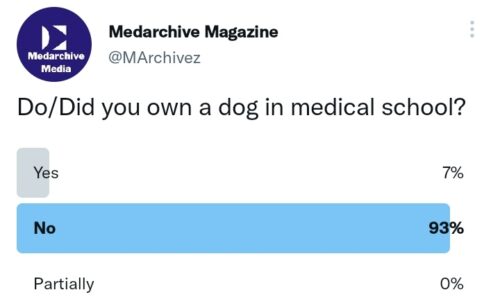On my own, I would never encourage having a dog in medical school for any medical student. The stress in medical school alone is enough already to make burnout. And coupled with the troubles of having a dog in medical school and maintaining it; the cost of its feeding, the play time of the dog, and coping with some of their misbehaviors would be enough to make you develop serious mental health issues.
But funny enough, after a very recent survey among medical students on our social channels, we observed that a small percentage (less than 10%) admitted to owning a dog in medical school. So if you like these persons, and you have such in mind, then this post is for you as I will be sharing the five important things you must consider if you plan on having a dog as a medical student.

Personally, I never had a dog during my medical school days. However, I had a female colleague who had a Shollie; a breed of both German shepherd and Border collie. Now, this is a very smart dog, easy to train but one challenge was that it required a lot of space and playtime.

They managed to get along well with each other, and today, the lady is a doctor. So the way I see it, having a dog in medical school and being able to cope with it is a matter of setting your priorities. And it is very doable. Besides, many other medical students have other passions they are also combining with schooling which are still parts of their distractions. So in this case you choose your own distraction.
Table of Contents
- 5 Things to Consider Before Having a Dog in Medical School
- The Best dogs for medical students
- FAQs
- Final Words!
5 Things to Consider Before Having a Dog in Medical School
There are 5 crucial things you must plan and account for before you go on with the plan of adopting a dog in medical school. They include:
- The cost of maintaining a dog in medical school
- Accommodation
- Misbehaviours
- Time
- The best dog breeds for medical students.
The Cost of maintaining a dog in medical school
Dogs are not as cheap as they may appear to look especially if you have never been a fan of dogs. Before I developed an interest in dogs, I never knew that those beautiful brown eyes that are human-loving are this expensive to get.
Now let’s assume you already own one, you are not yet free from the maintenance cost. According to theprucepets, the average basic monthly cost of owning a dog is $125 to $824. This includes their health insurance to help you cover veterinary bills, dog food, leash, bowls, and flea spray to mention a few.
This is so much of a liability for a medical student whose loans are piling up. But if you have the money to foot these extra bills for your dog, then this should not be much of a problem for you. You can move over to the next consideration.
Accommodation
The next thing you should consider if you plan on having a dog in medical school is their accommodation. You definitely do not plan to bring your dog to live with you if you have a roommate in school, except your roommate is a dog lover too and can tolerate it.
But even at that, having a dog as a medical student is best if you live alone, at home with family, or with a significant other who is able to look after your dog while you face your studies.
Dogs are space lovers. They need a lot of it to play, run around, use the toilet, and so on. So even though it might be possible to accommodate one while living alone in your preclinical years, it gets almost impossible during your clinical rotation years when you have to spend most of your time in the teaching hospital living together with colleagues.
Also, in some medical schools, clinical students are prohibited from living outside the teaching hospital. This is to help them run their clinical rotations smoothly with utmost concentration.
Misbehaviours
If you have a dog or any pet at all, you must have witnessed one or more of their misbehaviors firsthand. Some pets do this either as a comeback for you not giving them the best attention, if they are not well trained or if they are sick.
Some of these misbehaviors include; peeing or defecating in unauthorized places in your home, eating/tearing your medical books and money, becoming aggressive, and so on.
Or else you are an experienced dog owner, you should not think of having a dog in medical school if you cannot control these behaviors. It is advisable if you have always known the dog you wish to keep; it will make your bonding and understanding so much easier.
Time
Dogs are notorious time consumers. If you plan on having a dog in medical school, then you must make preparations for this. You should have a timetable that works for you and your dog.
It is actually unfair and selfish to bring a dog to stay with you in medical school and you go for long hours studying or minding your medical school business without making out a play time for it.
Dogs need to be exercised, walked, trained, and played with regularly. And given that medical school is so jealous of your time as a medical student too, you should find a way to balance both if you really wish you keep a dog in med school.
The Best dogs for medical students

If you are a dog enthusiast, then you must have known that certain breeds of dogs are more trainable and less troublesome compared to others.
For instance, the female colleague in the example above had a Shollie. And according to her, it is very easy to train even though it requires a lot of space and playtime; like an hour or two a day.
For some medical students, this time is too much, but for some who are used to doing other extra-curricular stuff in school, it is affordable.
Having done a little research on other good dog breeds for medical students, I am convinced that the following would not be much of a problem for you if you are considering having a dog in medical school.
The best dogs for medical school include:
- Great Danes
- Akita
- Welsh terriers
- German Shepherds
- Shih-Tzus
- Rottweilers
- Great Danes: This dog breed originates from Germany; a descendant of the hunting dogs from the Middle Ages. Despite their big size, they are sweet, gentle, and affectionate pets who have a great desire to please. They are very easy to train to make them good dogs for medical students.
- Akita: Originates from the mountains of Northern Japan, this dog breed was originally used to guard and protect. However, it is also among the best dogs for medical students because of its loyalty and intelligence.
- Welsh terriers: Originating from Wales, this breed is claimed to be the oldest existing dog in the UK. It is very loving, easy to carry great cuddle companion, and perfect for your bad days in medical school.
- German Shepherds: These are very smart dogs, easy to train, although they are usually very leery of strangers. Their strength in relation to living with medical students is their independence and ability to stay alone for long periods of time.
- Shih-Tzus: They are popularly called toy dogs because of their small size and cute stature. They are bred mainly to be companions, although they find it very difficult to stay on their own. A Shih-Tzu is that dog that will most likely follow you to classes.
- Rottweilers: These are domestic dog breeds that are usually very aggressive but very affectionate towards their owners.
If you are really serious about having a dog in medical school, then you must diligently research the facts concerning these dogs yourself before making a decision.
It is better not to have a dog at all in medical school that to fail your medical school exams because you keep one.
FAQs
Can I Have a Dog in Medical School?
Yes, you can have a dog in medical school as long as it does not disturb or distract your neighbors and roommates. Even though the majority of medical students who are dog lovers prefer to avoid the distractions having a dog in med school might bring, a few medics still think it’s worthwhile and they are doing great.
Meanwhile, you must make sure you obtain permission from your school authorities if you plan to live within the hostel with your dog.
How to have a dog in medical school?
The first step to having a dog during medical school is to weigh the considerations which include; the maintenance cost, accommodation, time, tolerance for their misbehavior, and finding the best dog breed for medical students.
After you have made these considerations and still decide to move on with your plan of having a dog in medical school, the next step is to get vet insurance for your dog to reduce treatment costs, buy the necessary dog gear, write a good timetable to manage your studies and your dog, and you are set to go.
What is best for medical students?
The best dog breeds for med students are those breeds that have traits of smartness, easy trainability, and little independence over other breeds. Some examples of the best dogs for medical school include Great Danes, Akita, Welsh terriers, German Shepherds, Shih-Tzus, and Rottweilers.
How Possible is having a Dog during Clinical Rotations?
I wouldn’t say it is impossible having a dog during clinical rotations, but it will be very difficult both for you and the dog. You will not have enough time for the dog and your rotations and sometimes, it will be needful for you to sacrifice one over another.
What other pets can you have in medical school?
The closest alternative to having a dog is having a cat in medical school. Cats are very independent animals, and the numbers of persons who actually own cats in medical school are bigger compared to dog owners.
The good thing about owning cats is that it doesn’t need much space, and you can easily leave it for your daily activities without any worries as compared to dogs.
Some other pets include; birds, rabbits, guinea pigs, and fish.
Final Words!
On a personal note, I wouldn’t advise anyone to keep dogs in medical school. Unless you have a strong support system, the finances, and the intelligence to combine dog draining with your medical exams, then I do not see having a dog in medical school as a worthwhile plan.
However, if you are still hell-bent on your decision, I hope this article helped. I wish you the best of luck!



